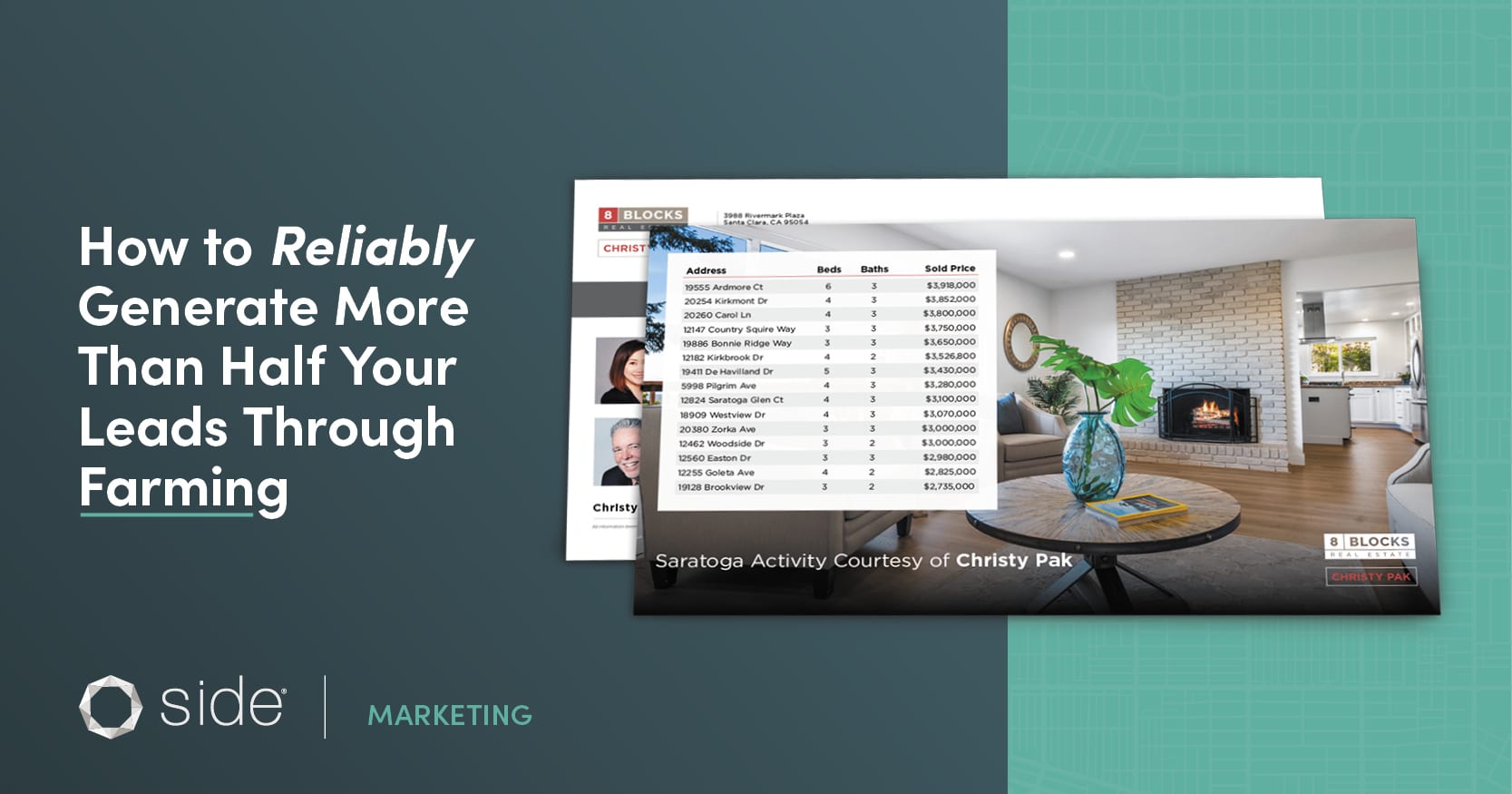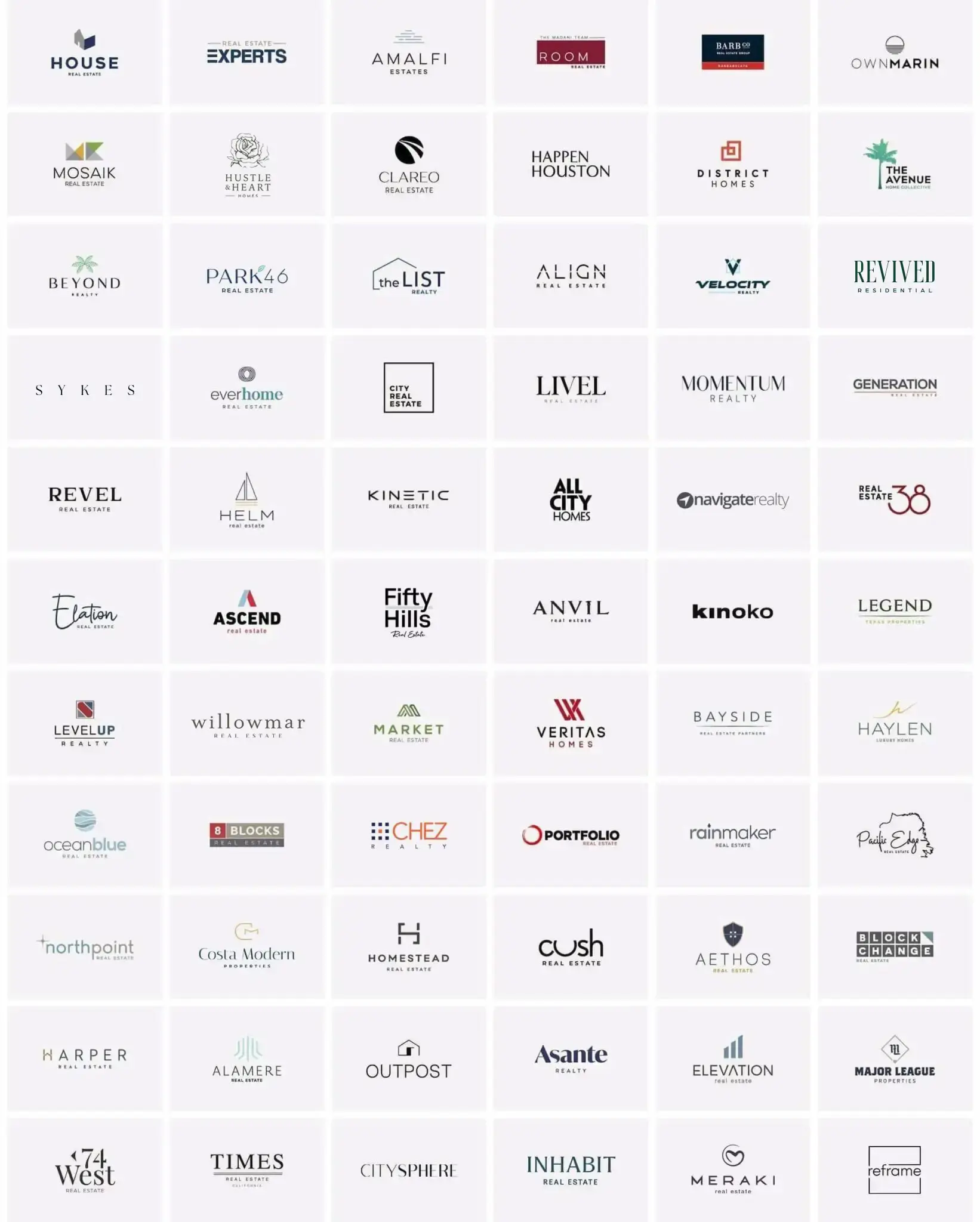
Geo-farming works. With the right outreach strategy — and a healthy amount of patience — you can become the go-to agent for a niche segment of your neighborhood.
Take it from Mei Ling, founder of 8 Blocks Real Estate, who transacted nearly $200 million in 2021. Nearly 80% of that business came from her farm of just 3,000 homes.
Jeff Rosa, co-founder at Market Real Estate, has seen similar success, with 50% of his business (he transacted roughly $75 million in 2021) coming from his farm of 7,500 homes.
But those results didn’t appear overnight — they were the result of focused strategy over the course of several years. Here are Mei and Jeff’s suggestions for replicating their results in your own business, shared at a Side Masterclass event.
1. Start where you live
When Mei first started farming in 2004, she targeted the areas around her existing listings. When she had an open house, she would send postcards to the surrounding neighborhood.
“That didn’t give me great results,” Mei reflected. “I didn’t get many leads, because these were areas I was unfamiliar with.”
So Mei switched her focus to the neighborhood she actually lived in and knew more about. “That made it much easier for me to walk around the neighborhood to hand out postcards and go door-knocking.”
Jeff made a similar move. “I bought a condo in a large complex and set up my farm there. My process started with walking around the complex, dropping flyers off at the doors. I liked the familiarity — you may as well work where you live.”
2. Systematize your strategy
The key to successful farming is setting up repeatable systems so you aren’t spending much time at all on each piece on creating and distributing each piece of collateral.
For instance, both Mei and Jeff started with in-person farming: physically handing out pamphlets and knocking on doors. But to broaden their farm — and decrease the amount of work they had to do to maintain it — they turned to Every Door Direct Mail® (EDDM).
“With Every Door Direct Mail®, you’re able to select and send to a postal carrier route,” explained Jeff. “That makes it very, very easy to expand your reach — you can just keep adding postal carrier routes but keep the messaging the same. The best part is, you’re not licking stamps or walking from door to door. All you have to do is set up one piece of marketing material and send it out.”
As Side partners, Mei and Jeff also have access to Side’s set-it-and-forget-it 12-month farming program. Mei and Jeff work with their Side business manager to determine their ideal farm radius and what content they want sent out, and Side handles the creation and distribution of the monthly postcards on their behalf.
“Farming works for established agents and new agents alike,” said Ashley Bledsoe, marketing director at Side. “We worked with someone newer to the business who doubled their market share year over year, even selling one of the most expensive properties in her farm area last year, all because she committed to marketing herself in the local neighborhood as soon as she became an agent.”
3. Don’t get discouraged if another agent is farming in your area
“When I started, there was another agent working in my farm who had been in business for 30 years,” said Jeff. “She was dropping off notepads every month, and everyone knew who she was.”
Jeff didn’t back off just because there was competition — and that determination paid off.
“That agent eventually retired,” said Jeff, “and it was a great opportunity for me because I had already done the work to establish myself.”
4. Always provide value
Many agents send updates on their latest listings, which communicate to prospects that you’re active in their neighborhood, pushing deals through.
That type of message is great at spreading awareness of your name and brand. But if that’s all you send, you risk coming across as too self-promotional and turning off prospects who may otherwise be ideal clients.
Here are some additional ideas:
A. Showcase a selection of local properties
“Every month, I pull a list of 13 properties from the MLS that span different price points,” said Jeff. “I want anyone who receives my mailer to be able to find something in their ballpark, so they have a sense of what’s going on in the market.”
Even though Jeff’s firm doesn’t represent all 13 properties, he highlights them to provide his prospects with a window into what’s happening in their market. And he always includes messaging to indicate his team is ready to help if a prospect has questions about any of the properties listed.
B. Educate homeowners
Jeff aims to be the go-to resource for homeowners in his farm on any issue, able to provide recommendations for stellar contractors, plumbers, landscapers, etc.
To that end, he regularly holds seminars with featured experts and encourages his farm to attend. And he advertises those events through direct mailers to his farm.
C. Sponsor and promote local initiatives and events
Farming can help cement your status as the go-to neighborhood expert. But you won’t be able to keep that status unless you’re also a good neighbor.
“It’s important to me to sponsor community events in my farm,” said Mei. “I might not have any affiliation with a school in my farm, but I’ll still sponsor their events. It’s important to demonstrate that you’re an active part of the community.”
When you prove you’re giving back to the community, members of that community are more likely to trust that you have their best interests at heart.
Jeff recalled sponsoring an event at his farm’s local elementary school where he dressed up in a dolphin mascot suit.
“I knew that having people see me out there would engage conversation,” said Jeff. “And sure enough, that day I sold a house to a teacher at that school because she approached me in the dolphin suit and asked if I had anything coming up on the market. It was a great conversation-starter.”
D. Create digital content as well
Farming doesn’t have to be all direct mail, all the time.
For example, to further establish herself in her farm, Mei started a YouTube channel that showcases both her listings and the community as a whole. She might interview the local superintendent, for instance, or film herself walking around and commenting on a particular section of the neighborhood.
5. Be patient and persistent
Farming is a marathon, not a sprint — the longer you stay with it, the better your results will be.
Farming is a marathon, not a sprint — the longer you stay with it, the better your results will be.
Mei started farming as soon as she got into real estate, diligently sending out postcards to prospects who had attended her open houses and doorknocking in the surrounding neighborhood.
“I think it took about six months for me to get my first client from that process,” said Mei. “Now I’ve been in the business for 17 years and I get referrals and past clients returning as repeat customers — all from my farm.”
This isn’t to say you’ll have to wait 17 years before seeing results. But it’s key to remember that Mei’s farm didn’t start generating 80% of her business right off the bat. Invest the time now, and results will follow in time.
“When I first started,” said Jeff, “I had a lot of people tell me: ‘I’m going to use so-and-so, because they’ve been here longer.’ Basically, they said I wasn’t going to cut it. Now five years later, I’m the market lead in my Zip Code, and it’s purely because of my persistence.”
“So many agents want immediate gratification,” said Ashley. “They want to send one postcard, one time and have listings fall on them like rain. But really, it’s about staying the course and being consistent.”
